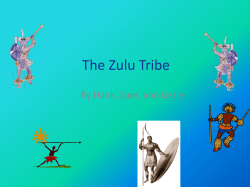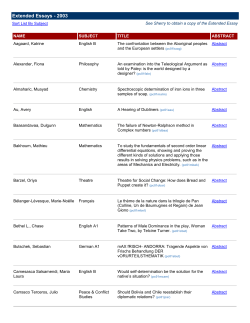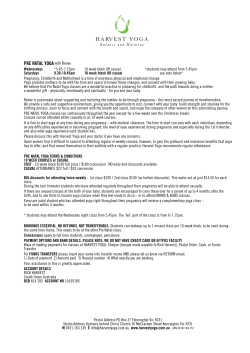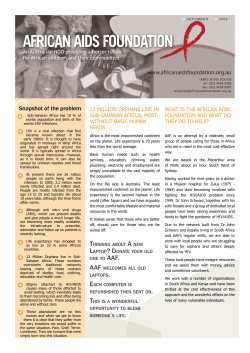
Document 26470
54 Soldiers' letters from the Zulu War: A source of historico-geographical value A hundred years ago Natal was a colony with its own garrison of British troops. The most tangible reminder of that state of affairs today is the old military cemetery of Fort Napier, with its epitaphs not only to dead soldiers but also to regiments that no longer exist. Historically speaking, it is diffi cult to reconstruct the attitudes and perceptions people held about events or other people in past times-it is often difficult enough to reconstruct how many people there were, what they did, where they lived, let alone their principles or prejudices. How did the citizens of Pietermaritzburg, for instance, regard the Imperial soldiers stationed in their town? We have a pointer to this in a book published in 1897 by Natalian (the author does not name himself) entitled A South African Boy: Schoolboy Life in Natal. It is clear from what he says that his memories ran back to the 1870s and 1880s, when the British fought campaigns against their Bapedi, Zulu, Basuto, and Boer opponents. As a colonist, he was not impressed with the army in its social and military spheres. "Tommy Atkins and his superiors", he says, "were not an unmixed blessing to the community". The Victorian officers were often too full of their own importance, con scious of their blue blood and distinguished pedigree. They condescended to nothing colonial except "to flirt with and break the hearts of the simple minded damsels of the better classes". At the other end of the social ladder, the ordinary soldiers merely amused themselves "with the coloured servant girl and half-caste washerwoman". Such comments are rare, as indicative of the gulf that stretches between then and now as they are of the Imperial garrison itself. Natalian does not pull his punches at all when he turns to its military prowess. "The fighting record of the British soldier in South Africa", he writes (before the Anglo-Boer War of 1899-1902, let it be remembered), "is not a brilliant one, his shooting, and his panic-stricken fear before the enemy, being a sad awakening for the colonial schoolboy fresh from the glowing accounts of British valour on other shores". This viewpoint is interesting because it reflects the particular events of the Zulu War of 1879, when his criticism is most valid. Thus he itemizes the incom petence of British generals, a charge from which it would be difficult to absolve Lord Chelmsford in 1879, also "the exploits of the poor half-grown weeds that composed the bulk of the rank and file of our infantry regi ments". Some colonists, certainly, had a poor opinion of the soldier sent out to fight Cetshwayo's army. Due to changes in military recruiting at home, it is true that young, half-trained troops were thrown into battle in Zululand. The 2/21st Regiment, for example, when it reached Durban in Natalia 8 (1978) Copyright © Natal Society Foundation 2010 Soldiers' letters from the Zulu War 55 March 1879 as part of the hurried reinforcement, mustered some 780 private soldiers. Of these, over 300 had been less than a year with the colours, and 117 (at the very least) were under 20 years of age. Despite the strictures of Natalian, on the other hand, and the doubts shared by some unknown stratum of his fellow colonists, these British troops stuck to their thankless job and won through in the end. Leaving aside the debate as to how much more efficiently and cheaply (in terms of dead and wounded, sickness, discomfort, savagery, and hard cash) the campaign could have been concluded, there is a valuable historical by-pro duct of the army's presence in Natal. By the closing stages of the war, Chelmsford had a vast force under his command. Including troops of all kinds-regulars, volunteers, levies, ancillaries-it numbered nearly 30000 men, not forgetting the brave band of women nurses who reached the Durban hospital in June. Together they easily outnumbered the 20000 population of Natalians, and-given that even 20 per cent of them would have written letters home-they must be reckoned to be a potential source of news about the country and its people, as well as the fighting against Cetshwayo's regiments. In terms of "information yield" they collectively brought a searchlight of publicity and observation to bear upon this emergent corner of Empire. When I began to collect such letters for The Red Soldier, I fully expected that the staff and regimental officers would hold a monopolizing share of the correspondence, to the exclusion of the other ranks. Such is not the case. No doubt the proportion of writers was a good deal higher among the officers, but the lower proportion among the men nonetheless furnishes a large number of letters that are as informative (if less polished) as the officers'. Their writings were quite often published in the local newspaper at home; others survive in regimental archives. Many correspondents of all ranks had served in other parts of the Empire, and elsewhere in Africa, for instance in Ethiopia and the Gold Coast; they could make comparisons with their new experiences in Natal and Zululand. The hard core of regi ments that took part in the first invasions of January 1879 had also fought previously in the "Old Colony" before moving up from the eastern Cape, and knew something about the country. The levels of literacy, powers of expression, and quality of writing are remarkably high among the other ranks. This reflects the improvements then going on in education within the army; the fact that certainly the younger soldiers would have benefited from the Primary Education Act of 1870; and, so far as the much-involved 24th Regiment goes, the peculiarly high level of schooling among young Welshmen, chiefly because of nonconformist religion and Sunday schools at home. As with any source that is used for understanding the past, the letters pose problems in their proper interpretation. They are wholly personal and therefore subjective, prone to the distortions or preconceptions of a single point of view. They may be inaccurate as to their factual basis, wrong either by commission or omission, as where they intend to exaggerate the numbers of Zulus opposing them in a given battle or the number of Zulus killed. As against that, the letter-writers were members of a single military organisation, which presupposes a threshold of uniformity (of whatever quality) in their experience, and so reduces the degree of variance in what 56 Soldiers' letters from the Zulu War they may say. In addition, there are so many of them that cross-checking is possible. They were private letters written with no specific thought of their publication, and therefore give a more genuine expression of views, without the risk of special pleading. This is why, when some controversial points from letters did appear in the British newspapers, there was such a furore from people with particular axes to grind, for instance the Liberal opponents of the war policy, or the Aborigines' Protection Society'S horror at the killing of wounded Zulus after the battles of Kambula, Gingindhlovu, and Ulundi. To illustrate the letters here, it is best to take in turn what was said by soldiers of different ranks, in ascending order, bearing in mind that the subjects they cover were the Natal environment as perceived by them-the country, its peoples, and their own business of warfare against a forbidding enemy. Owen Ellis was a veteran private of the 1/24th who, on the last day of 1878, wrote to his family at Caernarvon, North Wales. "In this spot, Helpmekaar, the days are as fine as those of summer, but we meet every night with heavy rains, accompanied by thunder and lightning, which continue until six o'clock in the morning. On 12th December there fell a heavy shower of hailstones which were as large as your fists, making it dangerous for anyone to be out at the time. One of them, weighed by the bandmaster, was three ounces in weight. I saw a hen that had been killed by the shower. There is very good cattle pasture here, far better than what is on the other side, viz. Trans kei, and this is beneficial to the farmers". Three weeks later Ellis was killed at Isandhlwana, as was his regimental comrade George Morris. He too wrote letters (to his mother at Pontypool) from Helpmekaar, while the Third Column assembled to invade Zululand. "I never seen such lightning in my life as in this country. I wish I was a civilian here for some time. I could soon save a lot of money as wages are very good here, and provisions not very dear. I suppose by the time or before you receive this we shall be on active operations against the Zulus, and they are very numerous and well armed, but God protect the right. There are lots of wild animals around here, deer, tigers (leopards?), jackals and poisonous snakes; the mosquitoes are a regular nuisance." Another victim of the impi at Isandhlwana was Sergeant John Lines of the 2/24th, a long-service soldier whose letter is in a more basic style. By October 1878 he was at Pietermaritzburg and even then did not relish the prospect ahead: "The Zulus have about 40 thousands of a standing army, and we have only about 6 thousand Europeans and 9 thousand volunteers (mostly Natal native levies), so I think we shall lose a good many, for they are too strong for us. And these KafIirs are a very barbarous lot; if they catch a man wounded they cut him open and take out his heart and eat it. Africa is a very heathen place, much more so than England. Soldiers' letters from the Zulu War 57 You can get land for about 4 shillings an acre, and some of it good land" . Among the officers of the 2/24th, Lieutenant Willie Lloyd was out with Chelmsford's half-column on the day of Isandhlwana. Afterwards he spent the next few months bottled up "in this cursed hole" at Helpmekaar, whence he wrote on 6th May: "The difficulties of this country are something enormous. The trans port is all oxen, to drive them you must employ Kaffirs, and we have just heard that Wood's foreloopers and drivers have run away. New ones will have to be got from the old colony (British Kaffraria), as the ones here can't be trusted, so that's another delay. The roads are fearful. Food there is none, and the great danger now is the grass which is about 8 or 9 feet high, and in a strong wind the grass burns at the rate of about 6 or 7 miles an hour. . . I have had a little shooting here, snipe, partridge, dikkop [diekap-otherwise known as the Cape thick knee. Ed.], buck of all sorts, rock rabbits, pigeons, etc. To give you some idea of the changes that come round in 24 hours, in the middle of the day a thermometer would be 115 or 120 in the sun, and when you turn out at reveille there is often a thick white frost. The cold has been something fearful here. We are on a high ridge and the wind whistles over it sometimes enough to take the skin off even a Kaffir. I have never been so cold at home but it's mostly dry, the only damp is the mists and clouds that come roaring up a high kloof near the camp". Not all the letter-writers were fully military men. Ralph Busby had joined Chelmsford's column as a civilian surgeon, and also witnessed the carnage at Isandhlwana. He found himself in the fort built at Rorke's Drift after the fight there, and less than a fortnight later had this to say: "All the farmers seem to have gone into laager, and left their houses. I had a five and twenty miles ride to one-Fort Pine (between Rorke's Drift and Dundee)-a few days back to see some who were sick there; the few farms passed on the road were all deserted and cattle driven off to near the laager. It's a queer sight inside, cramful of waggons, women, and children. But I got a good square meal, some tender mutton, fresh milk, with my coffee and butter, and had a good sleep in a covered waggon. . . It's very hot and cooped up in this place (Rorke's Drift), very much troubled with flies which swarm everywhere; they worry the horses frightful, I have now lost both mine. I expect the expense to the country before this war is over will be enormous; and of all the useless lands I have ever been in, South Africa is the chief." A more reasonable view (even before the discovery of Witwatersrand gold) comes from the letters of a young subaltern of the 90th Light Infantry. Although it was his first posting overseas, Robert Black Fell wrote some very informative letters, full of zest. The plentiful wild life appealed to his sporting instinct as he marched up-country (carrying the regimental colour) from Pietermaritzburg in the early days of November 1878. 58 Soldiers' letters from the Zulu War "The buck we have seen since landing are hartebeest near Sundays River and on the Buffalo flats, also reebok, oribi, duiker, and some wildebeest. The hartebeest is a splendid animal, the reebok is the commonest, they utter a bark like a dog. The reebok were hard to find, but have pretty horns. The only herd of wildebeest we saw are curious looking beggars, on seeing us they went off flourishing their heels and tails and cutting wonderful capers. The buck do give a jump when the rifle bullet comes under. . .Utrecht [where Fell's march ended] has a laager for the Beers in case of a Zulu war, a few houses and a big store and a court-house. There is a vlei close by and a stream comes down from the Burghers' Pass, which is thickly covered with thorn trees. There is an infernal duststorm blowing now, it is an awful place for sand storms, and seems to be always blowing a gale. The sandflies are in such swarms that one can hardly see two feet in front of you. . . The Boers say there are still occasional lions on the veldt between here and the Pongola bush. I made friends with a Boer called Uys living at Uys Kop, and he took me out guinea-fowl shooting but also shot reebok". New Year's Day 1879 found Fell stationed at Van Rooyen's farm and getting ready to make war. "An old hunter named Rathbone and the Dutch leader Piet Uys, who has joined us with his clan, told us all about the Zulus. This little farm is in a comfortable position and has a very good orchard, garden, and an avenue of eucalyptus trees. The old Boer owner is a famous hunter, of course we eat what we want as he has trekked with his family too, gone into laager to avoid the Zulus... We have been having the most terrific thunderstorms lately. At Balters Spruit the other day tents were struck, the lightning running down the tent-poles, splitting the rifles, fusing cartridges, destroying pouches and belts, and knocking men over. None of them were killed by it". Fell soon had something to say about the Zulus, on returning to Bemba's Kop from a raid down the Buffalo valley: "We revenged our troubles in a way by taking 8,000 head of cattle besides sheep and goats from the scattered kraals around. It is simply marvellous what herds these kraals possess. I was on day picquet by one of them, the Zulus seemed friendly and gave me some milk. They were fine looking people ... Zululand as far as we have seen it is destitute of wood and undulating, some of the hills pretty high, and covered with luxuriant grass on which our cattle and horses fatten splendidly". Again, while in the fortified camp at Kambula towards the end of January, he describes the landscape as "a boundless expanse of green grass, as far as the eye can reach, the Hlobane Mountain away to our front". He com plains about the rough diet he and his soldiers had to accept, although some relief came when a canteen waggon brought the officers tinned lobster, salmon, and two bottles of champagne apiece. Fell's father had asked him what he thought of Natal's prospects and if it was worth buying land there. Soldiers' letters from the Zulu Wor 59 "I think it will take a little time to recover; undoubtedly the presence of so many troops has brought in money and given it an impetus. The telegraph has been brought within 30 miles of Utrecht now, the railway will soon be completed to Maritzburg and 1 have no doubt will be continued to the coal deposits at Newcastle and Dundee. There is no doubt the country is full of coal and mineral, and said to be gold, and as soon as it is opened up by rail traffic will become valuable. An old farmer and hunter called Rathbone told me that from the day the British troops crossed the Blood River his farm near Luneberg trebled in value. Before they never were safe from threatened Zulu incursion. You can grow any fruit you like about a farm, the soil seems very rich, gum trees grow like smoke; the climate is very healthy. It wants railways, population, and capital to push it ahead". Captain Edward Woodgate was an experienced officer who had relatives in the colony. As one of Evelyn Wood's staff he had direct responsibilities for bringing the Fourth Column, based at Utrecht, into a state of prepared ness for war. He therefore looked closely at the local resources of transport, fodder, and roads, as well as building up the intelligence system of spies and advisers that helped make Wood one of the best British commanders. It is known that Natal suffered serious droughts in the late 1870s, and Wood gate's observations are useful in assessing their effects. The summer and winter of 1878 were very dry, so when Woodgate rode up-country in September he found little grazing along the last forty miles of road before Ladysmith, where "all the country is dried up. People are all anxiously looking out for rain, which ought to commence this month." It did not come, and the ground remained "as dry as a piece of toast and as hard as a turnpike road". A few drops of rain fell on 11th October but had little effect, and for the next five weeks the grass showed no signs of flourishing. Only by 27th November at Utrecht could Woodgate say that the drought had broken. "I don't think it has reached Natal yet, but the country is beginning to look less brown than it was; when the sun is shining on the hills, it is just possible to distinguish a very slight greenish tinge". The shortage of fodder for oxen, horses, and mules certainly contributed to the slowness of the British preparation for war along the Zulu borders. The drought years also heightened the competition for grazing by Boer and Zulu in these disputed lands, which were a prime cause of the war. Woodgate's comments on the townships he visited are revealing. Lady smith had originated in 1850 when a trickle of settlers reached the Klip River farmlands. "It would be called a village in England", he says, "and consists of about 25 houses of one kind or another. It has been going some 20 years, consequently the timber is pretty well grown, but the town itself progresses slowly". When he went to buy waggons and oxen at Wessel stroom, he found, "two small hotels, about the size of fifth-rate pot-houses in England, about three shops, and a dozen other houses. It is called a town, being the only collection of houses in the district, the nearest other towns being Newcastle and Utrecht, each about 30 miles off; they are a little bigger than this place... The country is very thinly populated. 1 only passed Soldiers' letters from the Zulu War 60 two houses, and three small Kaffir villages, yesterday during my ride from Utrecht". Perhaps the value of such observations is merely to confirm and extend the knowledge already furnished by other and more exact sources of historical information. On the other hand, the letters written by soldiers serving in Natal and Zululand are so numerous, and so variously different in origin, that they are a legitimate quarry of data for historico-geographical studies. As evidence of what went on during the Zulu War itself, of course, they are unrivalled in portraying the experiences of men involved at the sharp end of that bitter conflict. Things come to light that are unsuspected from reading the official narratives and dispatches, or books based on them at second-hand. For instance, only those letters written by the mounted volunteers of Baker's Horse, the Frontier Light Horse, the Kaffrarian Rifles and the rest, can really bring into focus the slaughtering pursuit of the Zulus after they broke at Kambula on 29th March 1879. FRANK EMERY NOTE ON THE SOURCES The full title of the book by an anoymous author, Natalian, brought up in Pieter maritzburg, published in London in 1897, is: A South African Boy: Schoolboy Life in Natal; the quotations come from pages 20-21. The figures concerning the 2121st Regi ment are taken from Lt. Col. W. W. Knollys, 'Boy Soldiers', The Nineteenth Celltury, vol. VI, 1879, pages 1-9. The introduction of short service enlistment (six years with the colours, six with the reserve) brought more soldiers into the army, while reducing the number of older, experienced men. In 1875, some 13 000 recruits entered on these terms; in 1878, they were as many as 25700: Lt. Gen. Sir John Adye, 'T1be British Army', ibid., p. 349. The letters of Owen Ellis were printed in The North Wales Express during February and March 1879; for their context, and other letters by him, see Frank Emery, The Red Soldier (London, 1977), pages 63-68. The letters of George Morris, John Lines, and William Whitelocke L10yd are in the archives at the 24th (South Wales Borderers) Regimental Museum, Brecon. The letter by Ralph Busby, a native of Leamington Spa, was printed in The Birmingham Daily Gazette, 2 April 1879. Second Lieutenant R. B. Fell's letters and diary were cited by Prof. S. H. F. Johnston in The History of the Cameronians (Scottish Rifles), vo!. 1, 1689-1910 (Aldershot, 1957), page 280. They are in the Regimental Museum at Ayr, and I am indebted to Mrs. Helen Sienkiewicz for the use of a full typescript copy. Many of the younger officers who fought the Zulus were to return to fight the Boers twenty years later, often over the same ground. Fell was a case in point, arriving with his regiment at Frere on 7 December 1899, going on to fight in the relief of Ladysmith. In the later stages of that war, Major Fell led a column in exhausting pursuit of Louis Botha, revisiting Kambula, Ulundi, and Isandhlwana; when the 2nd Cameronians finally sailed from Cape Town in 1904, he was in command of the battalion. Finally, the letters and diaries of E. R. P. Woodgate are in the possession 'Of his cousin's grandson, Dr. G. K. Woodgate, my colleague at St. Peter's College, Oxford. He too, returned to familiar scenes when he commanded a brigade in the Anglo-Boer War; as Major-General Sir Edward Wood gate he was fatally wounded at Spion Kop.
© Copyright 2025





















